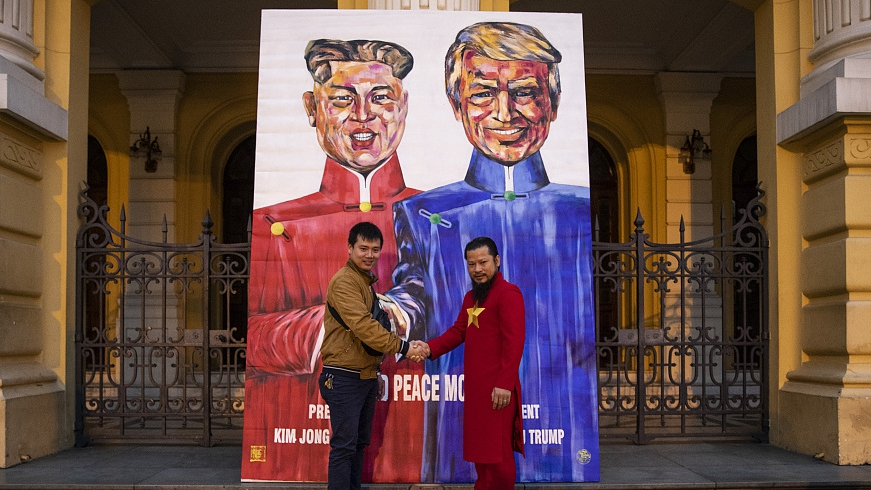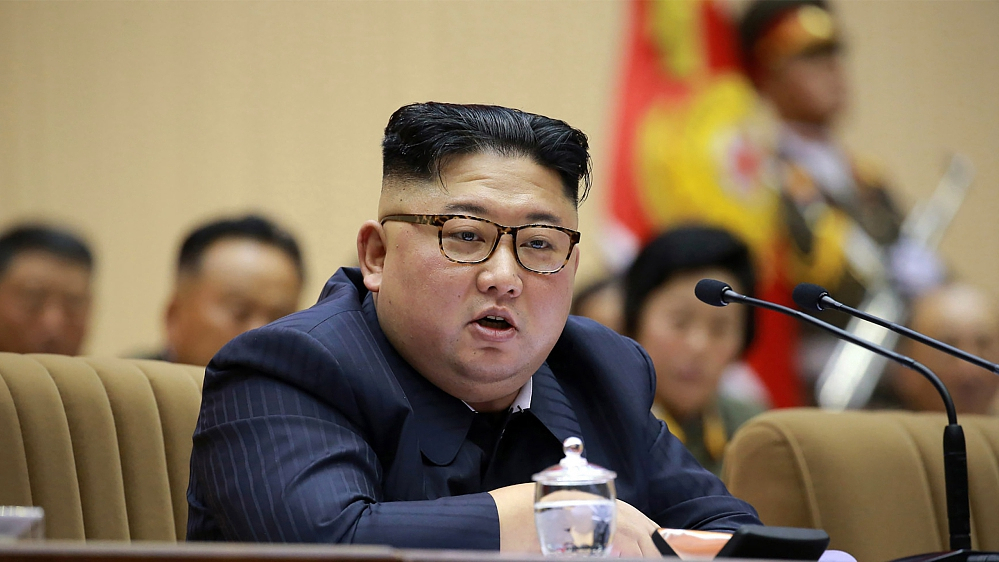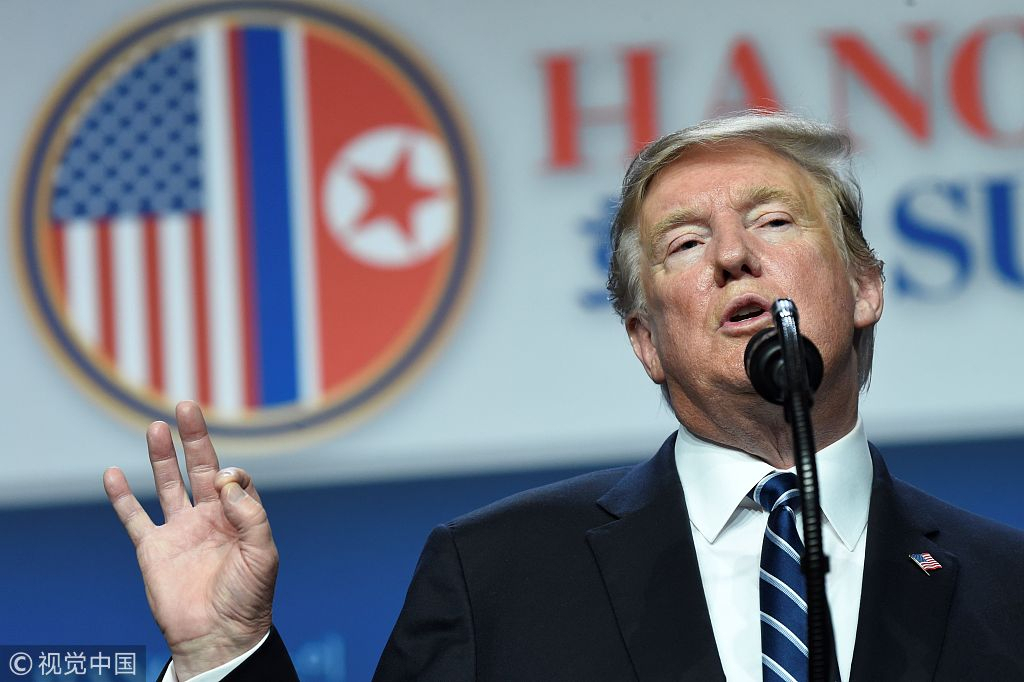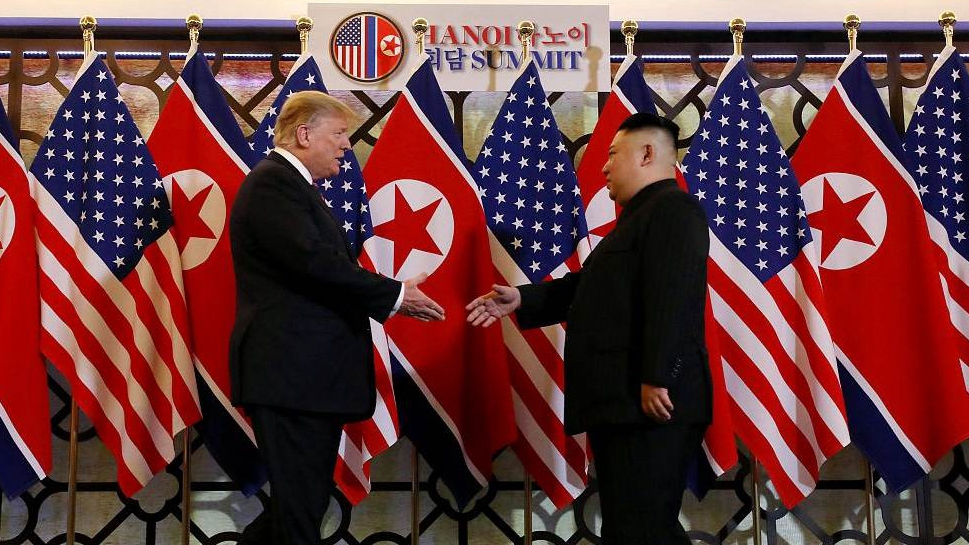Editor's note: Tom Fowdy is a British political and international relations analyst and a graduate of Durham and Oxford universities. He writes on topics pertaining to China, the DPRK, Britain and the U.S. The article reflects the author's opinion, and not necessarily the views of CGTN.
On Thursday, the Democratic People's Republic of Korea (DPRK) launched two short-range missiles from a facility on the country's west coast. Both projectiles were estimated to have traveled eastwards 420km and 270km respectively, landing in the sea.
Afterwards, the country's media hailed the "successful drill of deployment and strike designed to inspect the ability of rapid reaction of the defense units."
In response, Republic of Korea (ROK) condemned the launch as a violation of UN resolutions, urging Pyongyang to be considerate of inter-Korean peace agreements. ROK President Moon Jae-in later commented that the launch was a manifestation of Pyongyang's frustration following the negative outcome of the Hanoi summit between Kim Jong Un and Donald Trump in January.

People pose for a photograph with a picture of DPRK leader Kim Jung Un and U.S. President Donald Trump outside the Hanoi Opera House in Hanoi, Vietnam, February 28, 2019. /VCG Photo
People pose for a photograph with a picture of DPRK leader Kim Jung Un and U.S. President Donald Trump outside the Hanoi Opera House in Hanoi, Vietnam, February 28, 2019. /VCG Photo
With the test being the second one of its kind in just under a week, the DPRK is without a doubt upping the stakes against Washington.
Infuriated by the Trump administration's unwavering demand for unilateral capitulation to American terms, Pyongyang has been sending clear warning signals, albeit without crossing red lines, that they are prepared to turn back to the "old path" if their position cannot be respected.
With all of last year's good work at risk of being unraveled, it is the White House who are solely to blame for the deteriorating situation. To abruptly end the Hanoi summit was not a stroke of tactical genius or strategic prudence, it was a naive and reckless move so typical of Trump's abrasive disregard for serious diplomacy.
We're now seeing the consequences of that fateful day unfold.
How did we find ourselves in this situation?

A DPRK soldier observes through a binocular telescope at the truce village of Panmunjom inside the demilitarized zone separating the two Koreas, May 1, 2019. /Reuters Photo
A DPRK soldier observes through a binocular telescope at the truce village of Panmunjom inside the demilitarized zone separating the two Koreas, May 1, 2019. /Reuters Photo
On Washington's behalf there has been a purposeful inability to take the DPRK's position in regards to nuclear negotiations seriously. Among some policymakers in D.C, there is an unwavering mindset that Pyongyang can be eventually brought to knees and capitulate to unilateral, one-sided American demands of "complete denuclearization."
Despite the obvious lack of realism pertaining to this, the philosophy is prolonged and legitimated by broader considerations that the country can in the long run be forcibly changed not only in terms of its nuclear strategy, but also in regards to its political system.
In which case, the dictates of American strategic and regional interests are interfering with the immediate policy of addressing the DPRK nuclear issue, subsequently blocking and ruling out short-term gains or compromises.
This outlines the attitude of advisers such as John Bolton, widely blamed for Trump's decision in Hanoi.

DPRK leader Kim Jong Un speaks at the 5th meeting of company leaders and political instructors of the Korean People's Army in Pyongyang, March 27, 2019. /VCG Photo
DPRK leader Kim Jong Un speaks at the 5th meeting of company leaders and political instructors of the Korean People's Army in Pyongyang, March 27, 2019. /VCG Photo
With this pervasive attitude having "masterminded" the demise of the U.S.-DPRK summit in February, Pyongyang has responded with a growing display of discontent and a gradual escalation of tensions. This is not just bluffing, clear boundaries have been set. The United States have been given a deadline up until the end of the year to change its inflexible position.
If not, then a threat to return to the "Old path" has been touted. That might be interpreted as a resort to outright nuclear and missile testing again. The message is clear; the DPRK will not bow to pressure. It is open to talking, but as a state with emphasis on its own sovereignty: only on fair and equal terms.
Thus, to illustrate that it is truly serious about this deadline, it has resumed a series of periodical provocations to demonstrate it. Hence, two missile launches in a week. They are short-range missiles. While they are obviously not welcome to others, they are carefully attuned not to be enough (i.e long range or landing in Japanese water) to scupper dialogue outright.
Nevertheless in doing so, their capabilities continue to improve regardless. Thus they serve a dual purpose, to softly increase their leverage against the United States through enhanced technology, while also serving as a clear marker of what will come if things do not change.

U.S. President Donald Trump speaks during a press conference following the second U.S.-DPRK summit in Hanoi, February 28, 2019. /VCG Photo
U.S. President Donald Trump speaks during a press conference following the second U.S.-DPRK summit in Hanoi, February 28, 2019. /VCG Photo
But of course, we shouldn't really be in this situation at all. The Trump administration had a historic opportunity to create a deal with Kim which would have rolled back some of his nuclear capabilities, created a formal channel of diplomacy between the two countries, capped his missile advancement and offered unprecedented stability to U.S.-DPRK ties.
Yet, we were told that simply wasn't good enough, Washington should push harder for more; it shouldn't be a pragmatic and fair agreement, it should be one-sided capitulation in full obligation to American regional and strategic interests.
As a result of this, Washington not only has achieved absolutely nothing, but it risks in the process undoing everything that has been achieved in the past 12 months. With no political space or opening present as an exit ramp to the path of escalation, the bizarre egotistical decision to have walked out of the summit in Hanoi may ultimately stand as one of the greatest blunders and acts of naivety in contemporary U.S. foreign policy.
(If you want to contribute and have specific expertise, please contact us at opinions@cgtn.com.)






